#violeta gil
Text
Le tiene miedo a las expresiones del amor, pero las busca constantemente, no se quiere dejar llevar, pero se quiere dejar llevar, no se fía del amor, pero es lo que más le importa.
Llego con tres heridas, Violeta Gil.
#llego con tres heridas#violeta gil#read 2023#frases libros#frases literatura#frases literarias#libros#literatura#literatura española#leo autoras
85 notes
·
View notes
Text
Lo que has amado, esa será tu herencia.
10 notes
·
View notes
Text
Los diez mejores jóvenes debutantes del año en novela española según El Cultural
Los diez mejores jóvenes debutantes del año en novela española según El Cultural
En general me han parecido buenas elecciones unas mejores que otras porque como diría aquel: quién soy yo para cuestionar a los expertos, pero no por ello no voy a poner mi granito de arena.
Mira a esa chica / Cristina Araujo Gámir. Editorial Tusquets, 2022
Una chica sentada en un banco. El día despunta y los estragos de la fiesta de ayer aún se palpan en el ambiente. El tránsito de los que van…
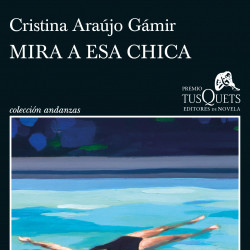
View On WordPress
#Andalucía#Óscar García Sierra#Cristina Araujo Gámir#Duelo#El hijo de la farmacéutica#Enfermedad#España desolada#facendera#Fernando Navarro#Josefina Jarama#la hija de El de los piensos#la señora March#ladrillos#Los Kopp#Manuel Guedán#Meryem El Mehdati#SUPERSAURIO#Victoria#violencia de género#Violeta Gil#Virginia Feito#western#Xita Rubert
0 notes
Note
don't let the fact that uki being scared of white people cover up the fact that Pekora owns a monkey
.
#vtuber#vtubers#vtuber confessions#uki violeta#nijisanji#nijisanji en#niji en#nijien#nijisanji english#noctyx#usada pekora#jil the monkey#gil the monkey#hololive#hololive jp#hololive japan#holojp#hololive gen 3#holofantasy#holo jp
14 notes
·
View notes
Text
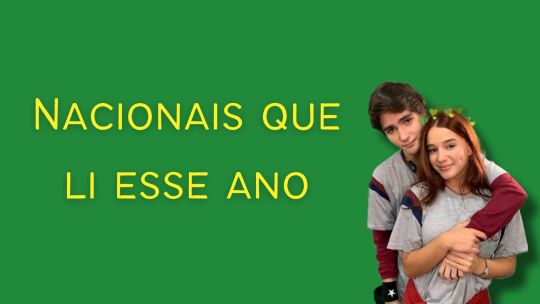
Oii, booklovers!
Primeiro, eu devo confessar que não li muitos nacionais esse ano - mas foi mais que nos últimos anos, então já é uma vitória.
Maaas, como são 16 livros, não vou comentar todos - até pq tem uns q já falei antes.
💚| Sonata em Punk Rock - Babi Dewet
Se vcs já assistiram Kally's Mashup, Go! Viva a Vida do Seu Jeito, Violeta, Sou Luna ou alguma série musical desse estilo, esse livro é praticamente a mesma coisa. Só que uma versão brasileira e pior.
Os personagens do livro são MUITO infantis e a autora fica alternando a narração do nada - nunca tinha lido nada com dois pontos de vista, fiquei sem entender quando mudou da primeira vez.
💛| O Duque de Campbell - Lika Toledo
A Clara Savelli que me perdoe, mas esse foi como uma versão de época de Mocassins e All Stars. Tem até o mesmo plot que eu ODIEI.
Sei que já disse algumas vezes, mas repetindo, espero que essa autora tenha uma boa evolução e melhore, assim como a Clara Savelli.
💙| Doce como Chocolate Meio Amargo - Paula Neiva
Para ser sincera, não lembro muito da história, mas acho que não foi tão ruim. Tem alguma coisa a ver com um vizinho irritante - daqueles que ficam com o som ligado o dia INTEIRO - e misterioso, além de ovos de chocolates pras crianças de uma ONG ou algo assim.
🤍| Modelo de (im) Perfeição - Thaís Lousada
A ideia é ser uma releitura do Gaston - versão feminina, óbvio - , faz parte de uma "saga" de releituras dos vilões da Disney escritas por várias autoras diferentes, mas essa foi a única que li.
Também achei legal, mas foi uma das minhas "leituras secundárias". Essa e a anterior foi quando tentei ler dois livros ao mesmo tempo pq um não estava indo pra frente e, pelo jeito, isso não funciona pra mim.
A Gabi é uma influencer super famosa q voltou pra sua cidadezinha natal por causa de sua mãe doente - que por acaso, está sendo acompanhada pelo seu ex. A volta do passado faz com que ela reflita sobre o presente.
💚| A Princesa da Coroa de Pedras Preciosas - Denise Beliato
Esse é um conto com moral, bem curtinho. Não tenho costume de ler sinopses, então estava esperando algo bem diferente, mas foi ok.
Basicamente, tem uma garotinha com uma coroa cheia de pedras preciosas, mas as outras crianças da vila, que tem coroas com menos pedras, dizem que a dela é feia. A garotinha acaba mudando seu jeito de ser para agradar os outros.
💛| O Cupcake da Discórdia - Stefania Gil
A Valentina, que não acredita no amor, tem um admirador secreto q quer se revelar para ela no dia dos namorados.
Sinceramente, não lembro de muita coisa, mas foi até legal. Sei lá, pelo jeito tenho problema pra lembrar de contos né kkkkkk com os do Sherlock é a mesmíssima coisa - fui reler um dia desses e fiquei tipo "mas mds, eu realmente li isso?🤡"
💙| Da Mesma Cor - Giovana Fochi
Terminei ele recentemente e nossa, conquistou meu coração! Grace e sua irmã estão recomeçando em um novo orfanato, mas ela já é um pouco velha e está "naqueles dias". Como não consegue encontrar nenhum absorvente e muito menos tem dinheiro para comprar um, Grace acaba saindo escondida a noite para roubar. Mas, o roubo não é bem sucedido. Outras coisas, no entanto...
O romance é muito fofinho, apesar de termos migalhas a maior parte do tempo. Amei q os personagens têm quase a minha idade, mas não entendi direito o que a autora disse após o final.
Gostaria de saber mais sobre eles.
Beeeeemm, eu resolvi fazer uma parte dois desse post. Não pq li nacionais de mais, mas pq aproveito e adiciono caso leia outros :)
• Sei q a maioria das minhas avaliações não foram boas, mas parece que, por algum motivo, as autoras nacionais às vezes fazem o final muito corrido - ou tem alguns erros de ortografia absurdos. Então, aqui vai uma dica: LEIAM O QUE VOCÊS ESCREVERAM! Não é em tom de crítica, mas realmente ajuda, pq tem coisas q o computador não corrige.
Então, por favor, revisem seus livros, se seus leitores tiverem algo a reclamar, pelo menos pode ser apenas questão de gosto.
Edit: a segunda parte ficou com os melhores, que li depois de fazer esse post e provavelmente vão ter outras partes pq peguei muuuuuitos e-books no dia do "Exploda seu Kindle".
🇧🇷| Quantos nacionais vcs leram até agr?
Bjs e boas leituras <333
6 notes
·
View notes
Note
I really thought that Gilbert was going to find out more about Violet's past. second Benedict said that he had found clues about his younger sister, but the subject is not mentioned again, we know that he has been saving to make another trip to find her
We should petition for Akatsuki Kana to write more, lol. Jk but I'd love if VE came back one day to explain all the shit that was never revealed or confirmed.
I am one of those people who first saw the anime and then read the novel, obviously I prefer the novel, without reading the novel, I realized that characters like Erika and Iris are empty, especially Erika who we only know that she wants to be a writer and iris i hate her
I like that “obviously” a lot. XD
Sorry it doesn't let me write much but it continued. Erika is a character who happens in limbo, she has nothing interesting and she has no chemistry with anyone. pffff Erika×benedicto seems like a joke, Cat, well at first it gave me a good impression, well you know I saw the anime first, but I prefer the Novela, even so it is the only one of the group of ch that I like as a friend of Violeta, or older sister, since they do have chemistry, I'm not satisfied with Cat anime, but I like it
Yeah, Tumblr has a character limit for asks! But don't worry, you can send me as many as you want whenever! Also, I agree, it felt like a joke. I guess it was a joke.
I agree with the take on Cattleya as well. She's the only canon character whose anime counterpart didn't bother me that much. But yes, she's a thousand times more interesting in the novel. I think I didn't mind her because they changed her appearance so much along with her personality that it felt like I was looking at an entirely different character, just with the same name.
I hate that they removed the gay part from the anime, but she is the only one in the anime who can be considered Violet's best friend, because they have a lot of chemistry. the only character that was created by the Anime that I like is Luculia, because unlike Erika and Iris (you don't know how much I hate iris) she is the only one who is interested in Violeta and wants to help her in a certain way, maybe they are not the best friends but they look good
Lux will always be the bestie and without her, there's no bestie at all! And yeah, I like Luculia too. I like all the characters from the Doll school, tbh. They were nice.
You don't know how much I hate Iris, it's something that has stayed with me since the 2nd chapter, she's a capricious girl and her reason for being a doll doesn't make sense, she doesn't seem to have talent either, in her story they want to make her look like someone who breaks stereotypes with him typical "there is more to life than marrying a man" and wearing pants
Not much makes sense in the anime, tbh. And actually, Iris did want to marry a guy, lol. Btw, her pants were a design choice in order to make the characters have different styles from each other, according to Takase Akiko. In the last movie, she's wearing a skirt.
without realizing Violet (more in the novel than anime of course) does not break, like breaking a pencil, if she does not put a bomb on the word stereotype and she is not a woman, she is a WOMAN (in the novel it is clearer why is more independent than in the anime, since in the novel he destroys even the universe) successful, hard-working, strong (strong if he falters if we talk about anime) and capable of anything for the love of his life (in this part I prefer put Gil novel)
I don't get why Violet's pronouns are masculine here, but I agree with this too.
Well, I've gotten off the topic of my hatred of Iris, she's an empty character, her actions have no motive or reason, they should have placed her in another section as a portfolio if she wants to break stereotypes so much, they should never have placed her as "Violet's best friend" that no one eats it
“No one eats it” I’m losing my shit at this bit.
Iris must have come across as someone who doesn't like Violet or someone who at first didn't like her, but now she likes her a little better, if we left her as a best friend she would be a bit toxic, don't you think?
Well, I don’t think they’re best friends. Even the anime never really mentioned that. Lux ftw.
Writing up to this point I realize two things: first, my hatred of Iris is more than enormous XD, second, violet anime does not have many "friends" and is much more lonely which makes me sad, because almost nobody really knows her
Yeah. That’s one of the things that gets me (in a bad sense) about the anime. It’s so unnecessarily lonely. So depressing. So bleak. Hardly anybody actually seems to have a deep connection with anyone, and when they do, it’s always the canon characters. The anime originals waltz in, do a few things, say some bullshit that supposedly is very deep, and boom, everything is solved. It’s so empty and so lackluster.
Violet anime does not have a solid relationship in the anime, rather she is alone, Gilbert anime, better not mention it because it would never end, Hog is an attempt at father, although in the end it is only if the boss who helped her and that's it, Erika and Iris are just coworkers, Cat is the only one who really cares about Violeta and supports her maybe not as much as the one in the novel, but she gives us a feeling of mother and daughter
I gotta disagree with that one. Even Cattleya was set aside in the movie. She was barely there and didn’t seem to miss Violet at all.
Benedicto is just a co-worker, Luculia will be like that friend you see from time to time, the real friend is Amy and it's sad that they can't see each other, that's why I don't think it's strange that Violet doesn't miss her classmates, when he leaves with PunkHoel Gil
Wow, this punk hoe Gil thing really will never die. XDDD
none can replace Lux who is quite interesting and has a certain resemblance to Violeta, and I have come to feel that they are like sisters and it shows that Violeta loves her very much, the one who half reaches her (well, she does not step on her heels) is Luculia who I felt similarity in wanting to help Violeta
Yep!
the ch team from the anime is a work team without depth and without development, you can't talk about them as "friends" or "Family" Hoggins and Cat would have a one night stand XD and neither has a friendly chemistry with Violet
Still not over the fact that Hodgins and Cattleya actually had sex in the anime. And Hodgins didn’t think much of it. Ugh.
the ch team of the novel are literally a Family there is a lot of chemistry between them and especially with Violet, they have a deep relationship and we can meet and sympathize with them
Preach!
in conclusion, violet anime does not have many friends, she is more lonely and does not have much chemistry with the other characters as it should be, in violet novel, she has a better relationship with the characters and I can feel that she is not alone and more with Gil novel violet novel can return home and feel a family a boyfriend and is safer, violet anime, returns home and only finds her co-workers
You get it!
I love you so much and sorry for writing a bible
I love you more! And I love bibles! Write as many as you want!
#violet evergarden#gilbert bougainvillea#claudia hodgins#cattleya baudelaire#benedict blue#lux sybil#iris cannary#erica brown#luculia marlborough#amy bartlett
19 notes
·
View notes
Text
Marcel Proust y el tiempo transformado. Rafael Narbona
Marcel Proust y el tiempo transformado. Rafael Narbona
En su monumental ciclo narrativo ‘En busca del tiempo perdido’, el francés reviste su biografía de ficción para averiguar quién es realmente y si ha aprovechado o malgastado la vida
Origen: Violeta Gil rescata un inquietante secreto familiar en su espléndida ópera prima

View On WordPress
2 notes
·
View notes
Text
Homenagem a Gilberto Gil
Homenagem a Gilberto Gil
A interpretação de Violeta Lara para a obra de Gilberto Gil encerra a sexta edição do Sarau Minas Tênis Clube. Cantora e compositora, graduada em música popular pela UFMG, Violeta atua como professora de canto e, além de seu trabalho autoral, é vocalista do grupo Baioquê e do bloco de carnaval Juventude Bronzeada. Foi uma das vencedoras do projeto “Cantoras Daqui”, do BDMG Cultural em 2009 e…

View On WordPress
2 notes
·
View notes
Text
La Feria de Zafra cuenta con un Punto Violeta que se ha presentado hoy con las autoridades regionales y locales
La Feria de Zafra cuenta con un Punto Violeta que se ha presentado hoy con las autoridades regionales y locales
El recinto ferial de Zafra cuenta, desde la inauguración de la FIG, con un Punto Violeta desde el que se facilita información por parte de las técnicas de la Asociación Malvaluna. Un espacio, instalado junto a la Caseta Municipal, que hoy ha sido presentado por la consejera de Igualdad y Cooperación para el Desarrollo, Isabel Gil Rosiña; la directora general del Instituto de la Mujer de…
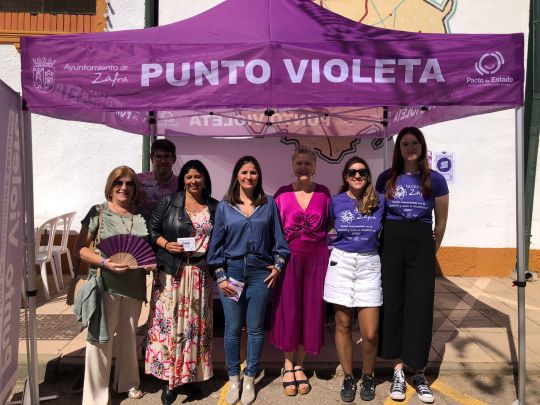
View On WordPress
0 notes
Text
Me he pasado mucho años de la vida tratando de todos los modos posibles no ser como mi madre. Y creo que ella siempre lo ha sabido y, a pesar de eso, me ha querido más que a nada.
Llego con tres heridas, Violeta Gil.
#llego con tres heridas#violeta gil#currently reading#frases libros#frases literatura#frases literarias#libros#literatura#literatura española#leo autoras#madre
46 notes
·
View notes
Text

Esa es, cobijada bajo los chopos y las cañas. La playa de las tardes largas y violeta, ahí dónde los pies pasean inestables encima de guijarros mojados, dónde nada el forastero que me habita tres meses al año. La corriente encoge los pezones, sin más música que la del río que baila, el mismo que lava las manchas de haber llegado, el que me lleva y al que a veces rehuyo. Recupero un tiempo sin tiempo, en el que empiezo a recordar algo que no sé exactamente pero que era importante. Champú, sal. Un tiempo que se acaba sin más, sabiendo que ya está, que los veranos no sólo son del mar, que los veranos no son sólo verano. / Barcelona, 2021 - Gil Garriga.
.
.
.
.
.
.
#photography #fotografia #35mm #filmphotography #analogicphotography #fotografiaanalogica #textospoéticos #poeticthoughts #summerending #river
5 notes
·
View notes
Text
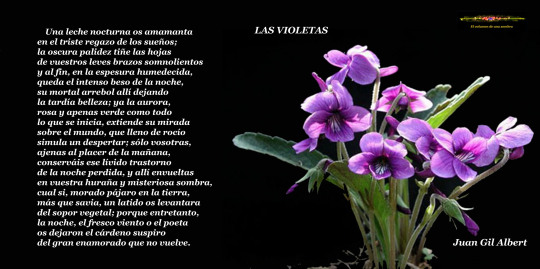
LAS VIOLETAS, de Juan Gil Albert
1 note
·
View note
Photo
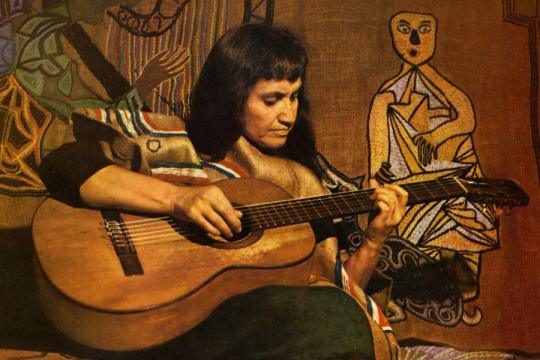
Here's our playlist from last night's show focusing on music of the 1960s! Wouldn't be complete without at least one song by the great Violeta Parra. The words to her songs still ring true 50 years later. Join us next Thursday on @kcsbfm for the 1970s 🎶
*Grand Kallé & l'African Jazz "Table Ronde" [DRC]
*Nico, Kwamy & Rochereau et l'African Fiesta "Belinda" [DRC]
*Super Jazz des Jeunes "Appran la vie" [HAITI]
*Henri Salvador "Syracuse" [FRENCH GUIANA]
*Violeta Parra "Miren Como Sonríen" [CHILE]
*Baden Powell & Mauricio Einhorn "Pro Forma" [BRAZIL]
*El Kinto "Don Pascual" [URUGUAY]
*Unidad 5 "Amaneceré sin ti" [GUATEMALA]
*Mahotella Queens "Jabulani Mabungu" [SOUTH AFRICA]
*Calypso Rose "Fire In Your Wire" [TRINIDAD]
*Celia Cruz & Tito Puente "Aquarius / Let The Sunshine In" [CUBA/PUERTO RICO/USA]
*Carlos Argentino "Por Una Cosa" [ARGENTINA]
*Nora Ney "Ninguém Me Ama" [BRAZIL]
*La Sonora Dinamita "Cumbia Barulera" [COLOMBIA]
*Orlando Contreras "Amarga Decepcion" [CUBA]
*Los Shains "Hoy" [PERU]
*Los Speakers "Te Olvidare" [COLOMBIA]
*Gilberto Gil "Louvação" [BRAZIL]
*Los Beat 4 "Lo Que Sera" [CHILE]
*Toots and the Maytals "Pressure Drop" [JAMAICA]
*Los Llopis "Quiero Amanecer" [CUBA]
*Leonardo Favio "Ding Dong, Ding Dong, Estas Cosas Del Amor" [ARGENTINA]
📷: Photo of Violeta Parra in front of one of her arpillera works, from ultimocero.com
#violetaparra #1960s #womeninmusic #chile #nuevacancion #musichistory #communityradio #kcsb
4 notes
·
View notes
Note
Espero que não chateie muito ao perguntar isto, mas é o seguinte. Estou com uma saudade do crl de Portugal. Que músicas/bandas portuguesas poderias recomendar assim à toa (que consideres clássicos, etc) para matar a saudade? Como emigrei à três anos (com 14 anos) nunca cheguei a ouvir/apreciar música tuga. Obrigada desde já.
não chateias nada! :)
vou listar vários tipos de cantores, de tempos diferentes, com estilos musicais diferentes. também vou usar “clássico” de uma maneira um bocado liberal, ou seja, vou-me referir a musica com que eu cresci (tenho 26), que os meus pais ouviam, ou que se tornou um marco tão grande na nossa cultura que basicamente toda a gente conhece se começar a tocar num bar.
Ala dos Namorados (clássico)
Ana Bacalhau
Ana Moura
Anjos (”clássico”)
António Zambujo
António Variações (clássico)
Aurea
Camané
Capitão Fausto
Carlão
Carlos Paião (clássico)
Carlos do Carmo (clássico)
Clã (clássico)
Cláudia Pascoal
Ciclo Preparatório
D'zrt(clássico- não, não aceito criticismo)
Delfins(clássico)
Da Weasel (clássico)
Dead Combo
Deolinda
Diabo na Cruz
Diogo Piçarra
Doismileoito
Dulce Pontes (clássico)
Entre Aspas(clássico)
Excesso (clássico)
Expensive Soul
Furia do Açucar
GNR (clássico)
HMB
Heróis do Mar (clássico)
Jafumega(clássico)
Jorge Palma (clássico)
José Cid (clássico)
João Gil
João Pedro Pais (clássico)
Lena d'Água (clássico)
Linda Martini
Luís Represas
Madredeus(clássico - para mim, peak Portuguese Experience)
Miguel Araújo
NBC
Nonstop (clássico, only haters will say im wrong)
O'QueStrada
Orelha Negra
Ornatos Violeta
Os Azeitonas
Os Capitães da Areia
Os Lunáticos (clássico)
Os Pontos Negros
Os Quatro e Meia
Pedro Abrunhosa(clássico)
Peste & Sida(clássico)
Quinta do Bill (clássico)
Richie Campbell
Rádio Macau(clássico)
Rita Guerra
Rita Redshoes
Rui Veloso (clássico)
Sara Tavares (clássico)
Silence4 (clássico)
Sérgio Godinho (clássico)
Sétima Legião (clássico)
Táxi (clássico)
The Gift (clássico)
Tiago Bettencourt (clássico)
Tiago Nacarato
Toranja (clássico)
Três Tristes Tigres (clássico)
UHF (clássico)
Virgem Suta
X-Wife
Xutos & Pontapés (clássico TM)
#Anonymous#musica#me: puts anjos on this list#tumblr user vagueandseeminhlydeep grabbing a sword: ill end you
83 notes
·
View notes
Text
Women in Amerindian Literature: an essay by Elisa Taber
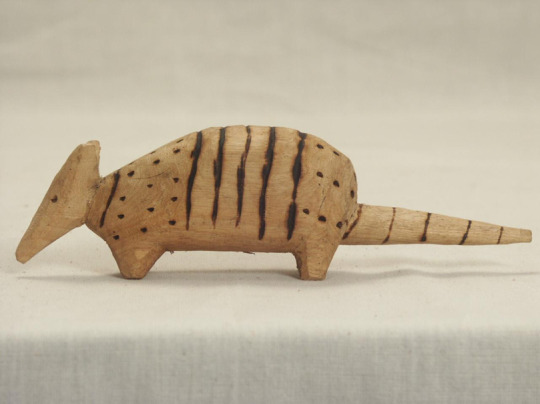
(Image: armadillo carving, a handicraft of the Mbya Guaraní, the indigenous community the poet Alba Eiragi Duarte belongs to.)
Women writing in indigenous languages in Latin America are working to both decolonize hegemonic feminism and to counter systematic linguistic censorship. Their poetic discourse posits that women’s rights do not need to be individualistic but communal and that national identity needs to be multicultural. It is not why but how they write, and the range of languages they use, that makes their writings impossible to group together under the label “indigenous literature.” The Mixe writer and linguist Yasnaya Elena Aguilar Gil has rejected the standard binary imposed on literary production in indigenous languages in Mexico, “I have yet to find a common trait that justifies that a literature written in such distinct languages and that belongs to eleven disparate linguistic families shares any grammatical features or poetic devices that, together, can be contrasted to Spanish.” (“(Is There) An Indigenous Literature?”) The distinctiveness of each indigenous language and culture must be respected and the conception of a ‘minority’ literary category that homogenizes them must be questioned.
Those eager to discover linguistic, cosmological, and poetic diversity should read the work of the following contemporary women writers: Natalia Toledo and Irma Pineda, Zapotec poets; Ruperta Bautista Vázquez and Marga Beatriz Aguilar Montejo, Maya Tsotsil and Maya Yucatec poets, respectively; Liliana Ancalao and Faumelisa Manquepillán, Mapuche poets; Lucila Lema Otavalo and Eugenia Carlos Ríos, Quechua poets; Alba Eiragi Duarte and Susy Delgado, Mbya Guaraní and Jopara poets, respectively.
The community of Latin American writers and academics studying Amerindian poetry–especially Violeta Percia and Juan G. Sánchez Martínez–have generously shared with me the work of these contemporary women writers. I encourage readers to visit Sánchez Martínez’s multilingual digital collaborative anthology platform, Siwar Mayu. The digital nature of this anthology shows that, as Walter Ong posits, it is electronic, rather than print, media that makes visible the transgressions writing inflects on transcribed orality. The auditory and visual performance components of oral literature are rendered through multimedia; i.e. the translated text is accompanied by recordings and illustrations. A lyrical, fictional, or non-fictional piece is published in the original indigenous language as well as in Spanish and English, together with an illustration by an indigenous artist and an essay by an indigenous academic reflecting on the work’s literary value. The result, which is not simply the transcription but the multi-sequential and multisensory translation of oral literature, calls forth a secondary orality.
The poetry of these Zapotec, Maya, Mapuche, Quechua, and Guaraní poets present distinct modes of production, lyrical devices, and linguistic features that are jointly defiant of their Western counterparts. Their collections live between Spanish and an endangered indigenous language. They are crafted and distributed orally; transcription is a secondary and sometimes unnecessary step. Many are self-published in print or online, via social media. Language loses its weight this way; it becomes ephemeral, alterable, it ceases to belong to one person. However, the content is firmly rooted in the soil, sometimes focused on the quotidian–specifically, the act of boiling a potato–and other times on the metaphysical– specifically, the distance between life and death bridged by another conception of corporeality within time and space. I believe this poetry is excluded from the national canon of each country these poets belong to precisely because there is so much complexity encrypted in its apparent simplicity.
In this post I will introduce the poetry of the Paraguayan poet, Alba Eiragi Duarte, who writes in Mbya Guaraní (which is distinct from Jopara, a variant of Spanish-inflected Guaraní) and will discuss how her work is excluded by a definition of national literature so narrow that it has no place for indigenous poetries. Eiragi Duarte has introduced, illustrated, and self-published her collection Ñe'ẽ yvoty, ñe'e poty (Our Earth and Our Mother), writing bilingually in Spanish and Mbya Guaraní. The first section consists of sixteen of her own poems. The language and content are simple. The poems address ontological subjects: what it takes to survive, to cook, sleep, and work. Or what it means to be alive: the passing of the seasons, the transition from dawn to dusk, the birth and death of loved ones. The lines are short but read as sentences, almost like instructions. The language is formal and distant until speech erupts, In “Pore’ỹ” (The Absence), the third person narration shifts to the first with the lines
Che kérape rohecha,
che páype rohechase
che membymi porãite
I see you in my dreams and
when I wake, I wish to see you,
my daughter, my life.
Emotion is unmediated yet counters nostalgia with a sense of what is real now: her daughter is deceased and the narrator, alive. There is nothing mythical about these poems, if myth is defined as the attribution of human intentionality to the inexplicable or meaningless.
In her last poem, “Che Rata” (My Fire), day dawns, the narrator lights a fire and sets a sweet potato, a mandioca, and a kettle atop it. The poem ends with the lines, “che rata ikatupyry, / ombojy ha’uva’erã” (fire is vital, / it cooks food). Life appears to be as simple as waking. Regaining this clarity is a task that is as complex for the reader as it is for the author. The poet refuses to be distracted by the superfluous and encourages the reader to do the same. Alba Eiragi Duarte is, above all, an ethical poet. There is a circularity in each text that is intrinsic to the author’s conception of life and poetry: what is simple is complex and what is complex is simple. She has no need to resort to complex metafictional device to underscore this paradox.
In the second section, titled “Mombe’u añeteguaite Avá Ruguái rehegua” (The True Story of Avá Ruguái), Eiragi Duarte retells a religious myth. (In Guaraní Avá means man and ruguái, armadillo.) Avá Ruguái is like a man, but is more solitary, agile, and cruel. When men hunting in the jungle enter too deep to return before nightfall, he puts them to sleep and kills, quarters, and skins them. The poet recounts the story of the man who kills Avá Ruguái because Ruguái has killed his brother. In one scene, the narrator squats in the scrubland, watching Avá Ruguái lift his sleeping brother by the nape of his neck. There is something cinematic about the specificity with which corporeality in space is described. Time is ambiguous but the events that are recounted seem to occur in the span of one night.
The wilderness—its flora and fauna—is heightened by the descriptions and accompanying illustrations. It is as though the quebracho and palm trees witness the events as the readers do. Behind a low stand of thorn bushes, a man lies stiffly on the ground. The tips of his feet point right. He wears a dark shirt and light pants. His silhouette is delineated by the darkest line in the drawing. His eyes and mouth are lightly sketched, they fade into the white paper. He grips his hand over his abdomen. He seems dead, not asleep. Another man stands over him with a bow in his hands and a sack full of arrows on his back. Palm trees lean left and right in the background. The rigidity and lack of expression of the human figures is in stark contrast to the ornamentation and movement of the bushes and trees. The book’s illustrations underscore people’s inflexibility towards the elements of nature, which in turn adapt to them. The narrative shows the retribution of nature, embodied by Avá Ruguái, to the transgressions of humans.
Eiragi Duarte recites these poems and stories, transcribed on illustrated placards, to children in rural schools across Paraguay. This educational program counters the loss of knowledge of the Mbya Guaraní language and of sacred narratives. She comes from an oral or mnemonic tradition in which authorship is not individual but communal. The poet compensates for the transgressions writing inflects on transcribed orality by combining her poetry with stories that have been passed down to her and by illustrating both on the placards.
She aspires to create a national Paraguayan literature that is multilingual and multicultural. Yet her poetry is intrinsically untranslatable unless the conception of literature broadens to include her manifesto of social ecology. In the introduction to the book she not only posits an equality between genders but also between human beings and nature. By conceiving of human rights and authorship in a communal sense, and at the same time blurring the distinction between the social and ecological, she forces readers to regard the parts of a whole as distinct yet interconnected in new ways. Behind the apparent simplicity of these poems and stories lies a true reconception of reality and how it is rendered in fiction and poetry.
The term literature must be challenged because it reduces these verbally organized materials to a variant further developed by literate cultures. With respect to sacred narratives, the term authorship must shift from an individual to a communal definition. The narratives do not belong to the ones reciting them—they only author a version—but rather to the millenary indigenous cultures the reciters belong to. The history of the transcription and translation into Spanish of poetry from indigenous languages since the conquest has three stages. The first was carried out by missionaries; the second, by social scientists, specifically linguists and anthropologists; and the third, by writers.
I have featured the work of Alba Eiragi Duarte in this post because it speaks to the literary properties of the text, rather than exclusively to its cultural or linguistic aspects. She shows that the culture or language is not so much in danger of extinction as it is at risk of voluntarily subjugating itself through national aspirations to westernization. She also proposes that her translations are parallel versions of the original. It is only by challenging the terms “literature and authorship” that the national as well as the continental canon will be broadened to include indigenous poetry. Failing that, its lyrics will continue to circulate orally as common knowledge, but without validation as artistic works in their own right, not folkloric artifacts.
—Elisa Taber
Works Cited
Aguilar Gil, Yasnaya Elena. “(Is There) an Indigenous Literature?” Translated by Gloria E. Chacón. Diálogo, vol. 19, no. 1, Spring 2016, pp. 157-159. (Original article in Spanish published in March 2015 in Letras libres (https://www.letraslibres.com/mexico-espana/libros/literatura-indigena).
#Yasnaya Elena Aguilar Gil#indigenous languages#mixe#Siwar Mayu#zapotec#maya#mapuche#quechua#guaraní#womenintranslation#elisa taber#Alba Eiragi Duarte
3 notes
·
View notes
Text
Opiniones de política española (2/10/2019)
10N: socialdemocracia o involución - Odón Elorza
Al pan, pan y al vino, vino - Javier Valenzuela
Bruselas, D. C. (distrito catalán) en el 1-O - Andrés Gil
Cataluña y la economía: el cóctel que puede poner patas arriba el tablero electoral - Isidoro Tapia
El paraíso de los impostores - Ignacio Varela
La torpeza de apuntalar el bipartidismo - Carlos Gorostiza
La última oportunidad de Albert Rivera - Ignacio Escolar
Las raíces de la crispación - Rosa María Artal
Martínez-Almeida, ese señor bajito al que le gustan los símbolos - Violeta Assiego
No sabemos la sentencia, pero sí que la campaña está condenada - Benjamín Prado
Pedro Sánchez, el españolazo - Rubén Amón
¿Usa Sánchez en vano la palabra 'España'? - Antonio Casado
¿Veis como el multipartidismo no funciona? - Gabriel Sanz
1 note
·
View note